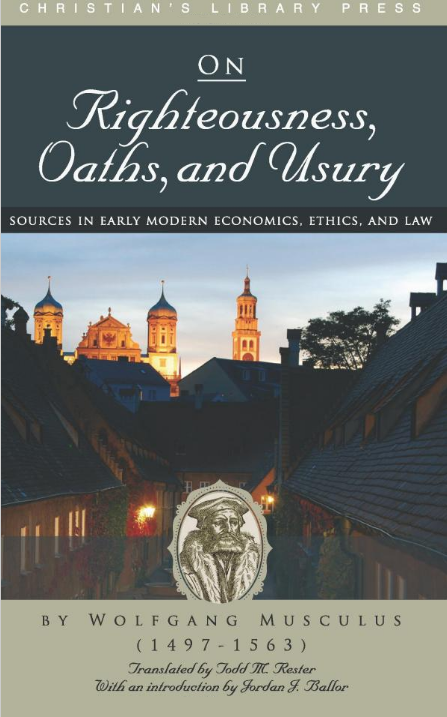Musculus (1497–1563) was a second-generation reformer in the cities of Strasbourg, Augsburg, and Bern, and produced a variety of works, including an influential collection of theological topics, the Loci communes, or Common Places.
The contents of this new translation come from his commentary on the Psalms, his largest exegetical work and one of his most popular. Portions of the commentary were originally published in German, Dutch, French, and English throughout the sixteenth century. Although Musculus has been somewhat overlooked among the likes of Luther and Calvin, particularly this side of the Atlantic, his works had a significant impact on the Reformation and post-Reformation eras.
As Jordan Ballor writes in the introduction:
Musculus’ reflections on usury in Psalm 15 are significant because they represent a stream of Protestant thought that largely has been ignored by economic historians. The preeminent significance of Calvin’s thought on usury for the development of modern economics has been the subject of debate for the last century, but efforts to correct, modify, or replace the Weber thesis have tended to focus on antecedents to Calvin, whether they be Reformed (as in the case of Heinrich Bullinger) or Roman Catholic (as in the case of the school of Salamanca). In contrast to Reformed thinkers such as Calvin, Bullinger, and Bucer who modified to a greater or lesser extent the received theological perspectives on usury, Musculus represents the continuing vitality of a more restrictive, less permissive approach to these questions…
…Musculus’ commentary on Psalm 15, including the appendices on oaths and usury, has a threefold significance. First, the commentary stands as a significant example of the application of interpretive method in the history of exegesis, as Musculus comes to two radically different conclusions about seemingly equivalent prohibitions in the words of Christ, based in part upon their respective approbation or proscription in the psalm. Second, Musculus’ psalm exegesis and appendices function as topical moral texts, forerunners of later and more developed Protestant ethical thought and casuistry. Finally, Musculus’ treatment of oaths and usury are representative of influential streams of Reformed thought on social, political, legal, and ethical affairs that continued to be formative for the next two centuries.
Purchase the book here.
Check out other titles in the Sources in Early Modern Economics, Ethics, and Law series for more English translations and editions of formative but previously inaccessible texts in the realm of economics, ethics, and law. Subscribe to CLP’s mailing list for updates on forthcoming titles.
[product sku=”1198″]
